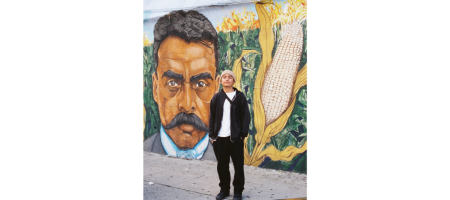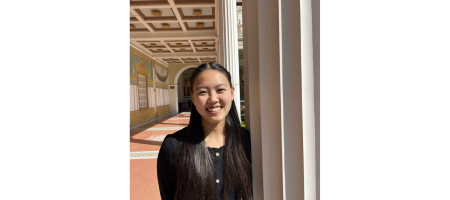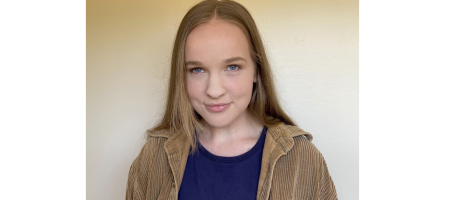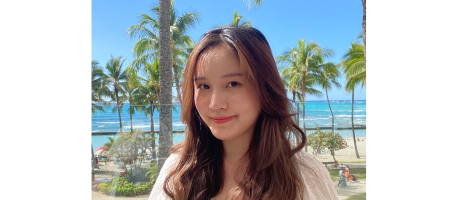Student Spotlight – Frank Godinez
Meet UCLA undergraduate researcher Frank Godinez!
Frank majors in Sociology and Political Science and is a Mellon Mays Undergraduate Fellow. The title of his project is “Police, Nonprofits and the Carceral Web.” Frank studies critical theory, Marxist theory, carceral capitalism, and the police state, and is using his research to employ a critical approach in advocating for/creating epistemologies that dignify and assert the agency of those harmed by—and who’ve resisted—systems of oppression. His best piece of advice is to read about a topic that interests you and don’t be so strict about the research process.
How did you first get interested in your research project?
I took a methods course that came really easy to me, and one day, I came across a section on ethnography. I remember thinking, “Wow, this is research?” Over the break, I read a book mentioned in our textbook, Sudhir Venkatesh’s Gang Leader for a Day. Being from South Central and system-impacted, I remember having so many critiques of the project. So, when I took Dr. Jason Sexton’s Sociology of Crime course, and the final project was a research project, I knew what I was going to do. I conducted a small ‘ethnography’ documenting the oral histories of (former) gang members, reconciling their narratives with larger sociohistorical and political-economic trends. At the same time, I connected with Dr. David Turner and joined his Abolition and Youth Organizing lab on campus, where we have been researching the Police Free Schools Campaign throughout LA County. Dr. Turner recommended that I apply to an SR-EIP program, and so I did. I got into UChicago’s Summer program and spent nine weeks in Chicago working with Dr. Robert Vargas on an independent project that looked at police philanthropy (private funding of police departments). After the summer, I decided I wanted to turn my project into a senior thesis and was encouraged by Dr. Vargas to work with Dr. Chris Herring at UCLA on my project. Since then, I’ve been admitted into the Mellon Mays Program while also working as a Bunche Research Fellow for Dr. Turner. I’ll continue multiple projects over my next quarters at UCLA.
What has been the most exciting aspect of your research so far?
I love falling into rabbit holes. And I love it when I find a source that is right on the money of the question/topic I’m interested in exploring. Specifically, I study critical theory, Marxist theory, carceral capitalism, and the police state. I also view my interest in the politics of abolition as a large, interconnected struggle, and seeing how there are so many different angles people have taken or that I can take in interrogating social life and institutions gives me hope. I also really enjoy that my research is grounded in a commitment to my community, and I would never want my research to be divorced from topics that are informed by my own personal experiences and identities.
What has surprised you about your research or the research process?
Probably just how iterative and creative you can be with it. I think there are specific recipes for what ‘traditional’ (social) science research looks like, but that doesn’t necessarily mean it’s good. It doesn’t have to be a step-by-step process like a controlled life sciences study. So, I try to be as creative as possible when I piece together what different authors have said about topics like carceral capitalism or what it even means. You’ll find that people trained differently (e.g., geographers/sociologists/public health) will offer different, interdisciplinary perspectives. This produces really complex and complicated pictures/answers to a lot of the social problems pressing us today. So, I try to unlearn a lot of strictly binary ways of thinking and or understanding things, especially social life.
What is one piece of advice you have for other UCLA students thinking about doing research?
Just read. Read about a topic that interests you and try to develop a question. It doesn’t have to be precise. Not unless you’re committing to a research program or something. Also, don’t be so strict with the process. Research is so iterative that you can approach it from so many different angles. Be it qualitative, quantitative, mixed methods – the choice is yours. That’s also why reading what other people have read can be a good starting point.
What effect do you hope your research has in your field, at UCLA, in your community, or in the world?
I am optimistic that I can someday become a leading scholar in urban sociological research with expertise in various specialized topics (policing, youth organizing, gangs, law, and policy) supplemented by my own lived experience to influence policy and the critical analysis of social and political institutions. I recognize that as a system-impacted male of color, I offer a lens that is highly underrepresented in the academy. My lived experience inspires me to employ a critical approach in advocating for/creating epistemologies that dignify and assert the agency of those harmed by—and who’ve resisted—systems of oppression.





